The best pear varieties for the Moscow region
Pear trees are often found in garden plots - the juicy and aromatic fruits are eaten fresh, used to make jams and compotes, and dried for the winter. The crop does not require special care and quickly takes root on any soil and in any weather. However, each region has its own varieties. Unpretentious plants that are resistant to high humidity and are immune to common diseases are suitable for the Moscow region.
We will consider further which pear tree is best to plant in the Moscow region.
The best pear varieties for the Moscow region
The choice of variety is influenced by taste preferences, garden area, and climatic features of the region. If the garden is small, low-growing trees with a compact crown are planted: they take up little space. Lovers of summer garden fruits choose plants with delicate honey pulp and rich aroma. For areas with sudden changes in weather, winter-hardy varieties are suitable.
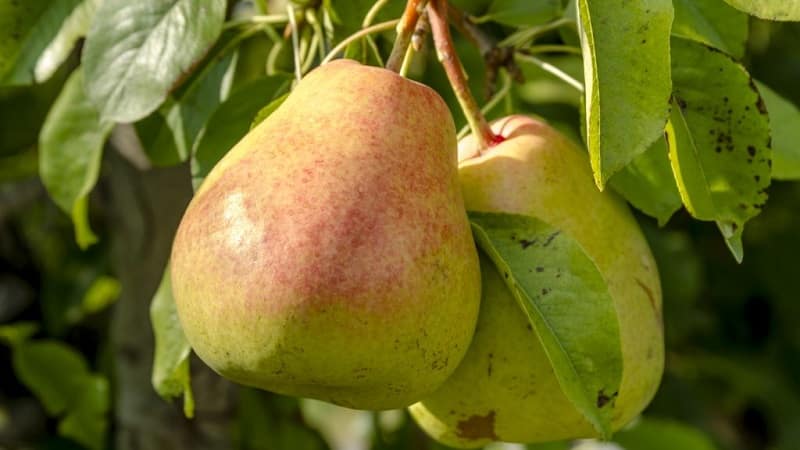
Self-fertile
Such varieties are pollinated and produce a stable harvest without the help of pollinating insects. The tree blooms on its own; it is not necessary to plant other fruit crops nearby. The best varieties of self-fertile pears for the Moscow region are presented below.
Chizhovskaya
Chizhovskaya blooms in mid-May, is unpretentious in cultivation and resistant to frost. The weight of the fruit is about 130 g, the skin is smooth green with yellowish tints. The taste is sugary, the flesh is pleasant and tender. Pears are stored for up to 4 months and are not damaged during transportation. After ripening, the fruits do not fall off.Fruits can be canned or eaten fresh, added to fruit salads and summer snacks.
Otradnenskaya
The variety is famous for its attractive green fruits with yellow and red areas. The weight of the fruit is 120 g, the shape is round, the peel is glossy. The pulp is sweet and sour, refreshing with a strong pear aroma. Otradnenskaya bears fruit 3 years after planting, is frost-resistant, and is suitable for cultivation on an industrial scale. Rarely affected by insect pests and diseases.
Lada
An early ripe pear for the Moscow region, suitable for small garden plots. The trees are medium-sized and bear fruit for 3-4 years. The weight of the fruit is 100–120 g, the skin is thin, the color is yellowish-green with a pink blush. The pulp is dense, sweet and sour, juicy. After harvesting, the harvest is stored for up to 2 months and is not affected by rot. It is recommended to eat fresh fruits.
short
The pear tree needs sunlight and free space. If trees are planted close together, the yield will suffer. To fit as many different varieties as possible on the plot, choose low-growing pears. The taste of the fruits is not inferior to tall and spreading trees.
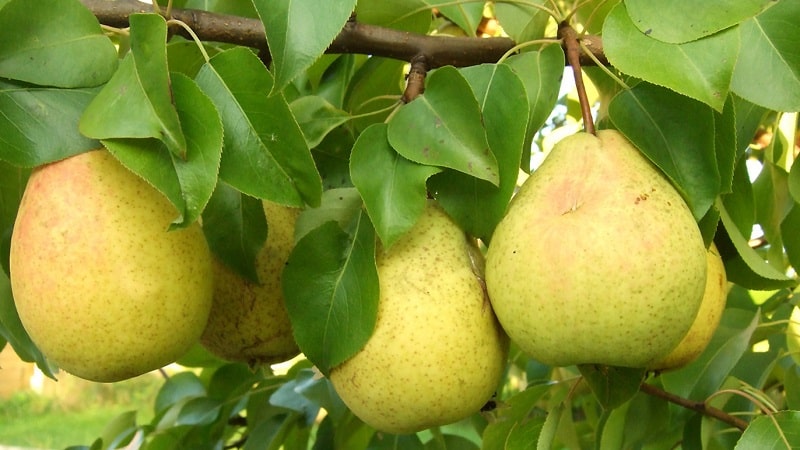
In memory of Yakovlev
The early autumn variety is distinguished by a compact crown and thick medium shoots. The fruits are classically pear-shaped, weighing about 110 g per piece. The peel is smooth and dense, the color is yellow with an orange blush. The pulp is juicy and oily. The taste of pear is sweet without sourness or astringency. The harvest is stored for up to 3 months. The purpose of the variety is universal.
Olivier de Serres
The crown is compact, the shoots grow straight up. The crop produces a harvest in the fall, the fruits are round, the average weight is 150 g. The peel is lumpy, gray-green with brown spots. The pulp is cream-colored, very sweet and juicy with an almond aftertaste.The fruits stay on the tree for a long time, do not fall off, and are suitable for transportation and long-term storage. Pears are eaten fresh and used to make compotes.
Parisian
The variety is classified as dwarf, the height of the tree is no more than 3 m. The harvest is harvested in early October. The fruits weigh from 200 to 250 g, the skin is smooth green with a pinkish color. The pulp is oily, sweet with a slight sourness. The culture is resistant to scab and rot. Fruits are universal in use.
Attention! In dwarf varieties, fruiting begins in the 2nd or 3rd year of planting. They are easy to care for and don't require a ladder to reach the top of the tree. From 4 to 8 kg of crop is harvested from one pear annually.
The sweetest and most delicious
The best pear has juicy honey pulp and a pleasant fruity aroma. Every gardener dreams of getting such a harvest. Various dishes are prepared from the fruit: fresh pulp is added to ice cream, baked with duck or turkey, mixed with other fruits to make a dietary salad.
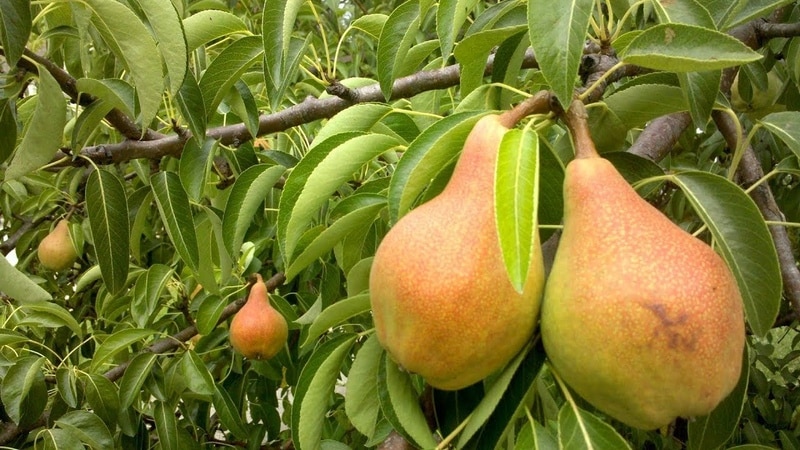
Children's
Medium-sized tree is unpretentious in care, yields a harvest within 3-4 years from the moment of planting. The fruits are small, weighing about 70 g per one. The color is yellow or light green with a pinkish blush. The taste is delicate and sweet, the flesh is dense white. The first harvest is harvested in early August. The fruits are stored for up to 2 months in a cool place. They are used for making juices and compotes, and added to baked goods.
Williams
One of the most popular and famous pear varieties. The fruits are large, weighing 150–170 g per piece. During the ripening period, pears change from a light green tint to a rich yellow, and a reddish blush appears on the side. The skin is thin and very fragrant. The pulp is sweet with a pleasant nutmeg aftertaste.Harvest in early August and store at room temperature for no more than 2 weeks. Fruits can be kept in the refrigerator for up to 2 months.
Prominent
The fruits ripen by the end of August and are harvested in 2 or 3 stages. The weight of the fruit is from 150 to 200 g, the peel is yellow-green of medium density. The pulp is juicy and oily with a bright aroma. The trees are tall (grow up to 5-6 m), so a spacious and sunny place is chosen in advance for planting. The fruits are consumed fresh and stored for the winter.
Winter-hardy
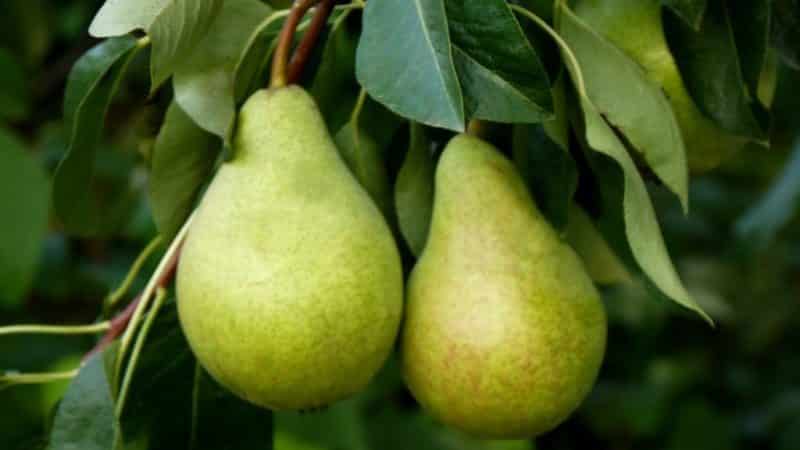
Although frosts and sharp drops in temperature are rare in the Moscow region, gardeners prefer to plant winter-hardy varieties. They rarely get sick and can withstand temperatures down to -20°C.
Autumn sweet
Trees of the Autumn sweet variety are spreading with a dense crown. The fruits ripen by the end of September or beginning of October. The taste is sweet and sugary, the aroma is pronounced, the flesh is white. The shape of the fruit is round, the average weight is 140 g. The color is light yellow, with rare brown spots.
Reference! To obtain a rich harvest, it is recommended to plant 1-2 trees of other varieties nearby. This is required for cross pollination.
Shelf life - up to 3 months, universal use.
Marble
A common variety not only in the Moscow region, but also in the north of the country. Withstands temperatures down to -30°C and is easy to care for. Fruit weight is from 130 to 180 g, in some cases reaching 250 g. The color is golden-green with a red blush. The skin is thick, so the harvest does not spoil for 3-4 months. The flesh is melting and grainy, white-cream. The taste is sweet, the aroma is rich and fruity. Marble is grown for personal use and sale.
Bessemyanka
Late summer early autumn variety. The fruits are small, the weight of one is about 80 g.The color is yellow with a reddish blush, the peel is rough. The pulp is yellow in color, the taste is sweet, the aroma is light fruity. Bessemyanka ripens in August. The shelf life of the harvest is only 10 days, so it is recommended to eat pears fresh or process them immediately. The advantages of Bessemyanka are frost resistance, self-fertility, stable yield and sweet taste of pears.
Pear varieties by ripening period
According to the ripening period, pears are classified as summer (early), autumn and winter. Summer ones are stored for no more than a few weeks, so they are eaten fresh or used in cooking. Autumn ones are kept in the refrigerator for 1-2 months. Winter pears are placed in a cool basement or cellar for storage; they do not lose their taste and marketability for up to 4 months.
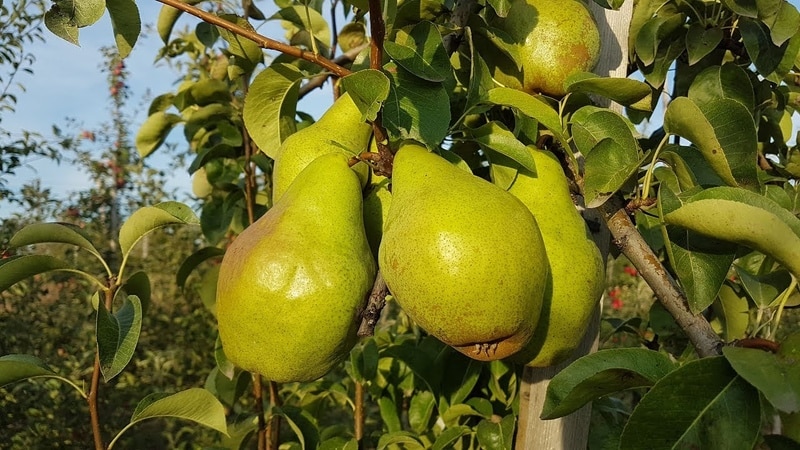
Early summer
The early harvest is harvested from late July to mid-August. The fruits are large in size and have juicy pulp. Such pears are suitable for both personal consumption and sale.
Moldavian early
The harvest is harvested by August 10. The trees are winter-hardy, rarely suffer from scab, and are not attacked by pests. The weight of the fruit is 100–150 g, the shape is oblong and pear-shaped, the peel is yellow-green with a blurred blush. The pulp is sweet and sour, oily. The variety is partially self-fertile.
Windsor
The trees are vigorous, with a spreading pyramidal crown. The fruiting period begins in the 5th year. The fruits are light green with brown tints. The pulp is white, juicy and sugary. The variety is self-fertile and unpretentious in care. The harvested crop is stored for no more than a week.
Banana
The tree is medium-sized with a drooping dense crown. The weight of the pear is about 80 g, the peel is smooth. The color is greenish with small subcutaneous dots. The taste is fresh-sweet, the aroma is rich. The variety is winter-hardy and rarely gets sick.The harvest can be stored for up to 2 weeks and is universal in use.
Interesting! Summer varieties are ideal for preparing tasty and aromatic strudel. The sweet pulp is combined with raisins, cinnamon, mint and a scoop of ice cream.
Autumn
Dried fruits, compotes and jams are prepared from the autumn harvest. Harvest the fruits a week before they are fully ripe, otherwise they will be too soft.
Granddaughter
The pear ripens before September 20 and begins to bear fruit 7 years after planting. The fruits are small, with an average weight of about 40 g. The rich yellow peel is dense, thanks to which the crop is stored for a long time. The pulp is white granular, the taste is sweet and sour. The variety is resistant to scab and insect attacks, and is characterized by keeping quality and transportability.
November
The variety is drought-resistant, does not fall off and rarely gets sick. The weight of the fruit is about 70 g, the shape is round, slightly oblong. The pulp is oily and tender; Noyabrskaya has a high sugar content (up to 11%). The skin is dense.
The harvest is stored in a cool, dark place for up to 60 days. Used to make dried fruits, canned or eaten fresh. In order for Noyabrskaya to bear fruit well, other pear varieties are planted nearby.
Tyutchevskaya
A fast-bearing tree produces its first harvest 4 years after planting. The pear is resistant to fungal and viral diseases; the harvest does not spoil for 2 months even at room temperature. The weight of the fruit is about 130 g, the color is yellow with blush. The aroma is fragrant, the pulp is moderately sweet, granular, pleasant to the taste.
Winter
Winter varieties are most often used for preservation or pickling. The fruits are distinguished by dense pulp and hard, thick skin. Part of the harvest is set aside for storage: placed in sawdust or wooden boxes, placed in a dry basement.
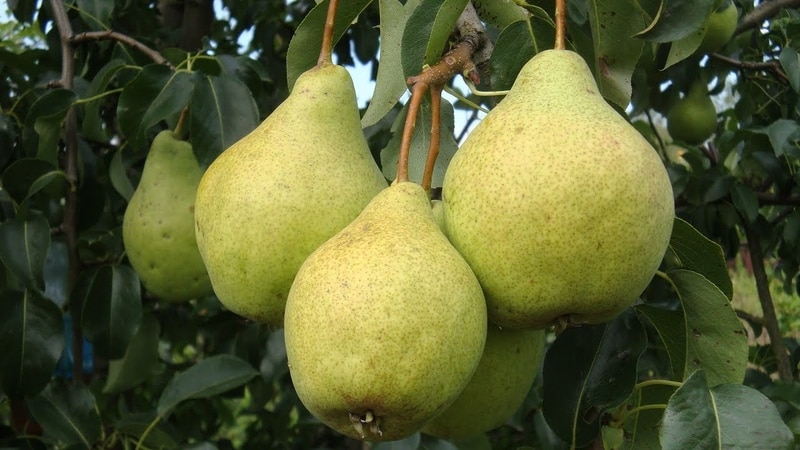
curé
The trees are spreading, the crown is dense. The fruits grow in bunches, the weight of one pear is about 200 g. The shape is classic pear-shaped, the peel is dense. At the beginning of ripening, pears are green, but gradually acquire a yellowish tint. The pulp is creamy, the taste is sweet and sour with a tart aftertaste. The shelf life of the crop is 2 months.
Kyrgyz winter
The universal variety is suitable not only for the Moscow region, but also for the northern regions. The variety is winter-hardy, resistant to fungal diseases. The weight of the fruit is 200 g, the fruit sits tightly on the branch and does not fall off. The color of the skin is green-orange with a bright pink blush. The harvest is stored in the basement until March.
Emerald
Due to its compact crown, the variety is suitable for growing in small garden plots. The pears are large, the weight of one reaches 300 g. The color is yellow with a scarlet blush. The pulp is white, juicy and very sweet. The peel is dense, the harvest is stored for up to 100 days. Suitable for long distance transportation.
Read also:
A selection of the best varieties of the most delicious winter-hardy pears for Siberia.
When does a pear blossom and ripen in the Moscow region?
Pear blossoms in May or early July. The exact timing depends on the growing area and weather conditions. The warmer the climate, the earlier flowering occurs. Most varieties bear fruit in the 3rd year, but there are also those that produce fruit only in the 5th, 6th or 7th year after planting.
Attention! When to remove pears from the tree? The ripeness of the fruit is determined by the change in color and fragrant sweet aroma. The pear becomes elastic, but not hard.
The ripening period of early summer varieties begins on July 20 and ends on August 30. Trees of autumn varieties bear fruit throughout September.Late pears produce a harvest in October and November.
Conclusion
Which pear variety to choose for the Moscow region? To get a harvest already in mid-summer, early ripening varieties are planted (Banana, Windsor, Moldavian early). Of the winter crops, choose Curet or Emerald. If the garden plot is small, compact plants that do not take up much space are suitable: Memory Yakovleva, Parisian.
When choosing a variety, pay attention to ripening time, taste and product characteristics, yield indicators, and reviews from gardeners. Popular trees are those that are immune to diseases and pests, self-fertile, and easy to care for.
And how to make a choice based on such an article? The heights of the trees are not given, there is no information on the coincidence of flowering phases for mutual pollination, the taste data is described approximately, everything is sweet and sour. But there is a difference between Williams and Izumrudnaya. What is frost resistance in comparison with those listed? By Uninformative for an expert.